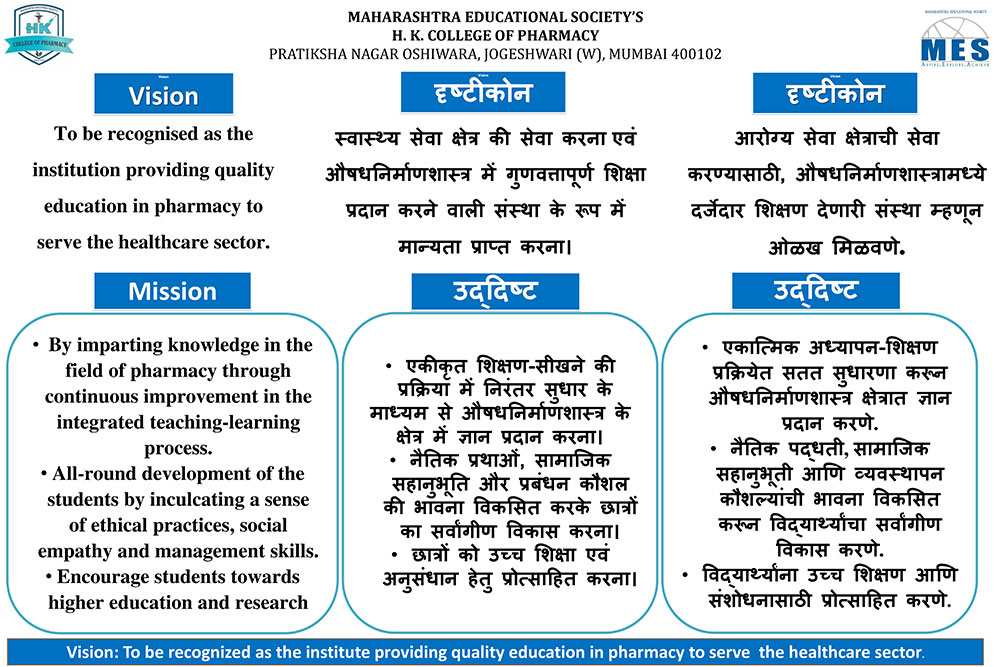
Vision
To be recognised as the institution providing quality education in pharmacy to serve the healthcare sector.
Mission
- By imparting knowledge in the field of pharmacy through continuous improvement in the integrated teaching-learning process.
- All-round development of the students by inculcating a sense of ethical practices, social empathy and management skills.
- Encourage students towards higher education and research.
Program Educational Outcome (PEO):
PEO 1: Career advancement & growth
Pursue post-graduate program or certificate courses and to succeed in academia, Pharmaceutical and allied industry.
PEO 2: Healthcare service
Serve the healthcare sectors such as hospital, clinical and community pharmacy.
PEO 3: Quality Analysis & Control
Practice pharmaceutical jurisprudence in the pharmaceutical and clinical sectors.
PEO 4: Self-reliance & Creativity
Demonstrate leadership, interpersonal skills and creativity to become an entrepreneur or professional.
Program Outcome:
- Pharmacy Knowledge: Possess knowledge and comprehension of the core and basic knowledge associated with the profession of pharmacy, including biomedical sciences; pharmaceutical sciences; behavioral, social, and administrative pharmacy sciences; and manufacturing practices.
- Planning Abilities: Demonstrate effective planning abilities including time management, resource management, delegation skills and organizational skills. Develop and implement plans and organize work to meet deadlines.
- Problem analysis: Utilize the principles of scientific inquiry, thinking analytically, clearly and critically, while solving problems and making decisions during daily practice. Find, analyze, evaluate, and apply information systematically and shall make defensible decisions.
- Modern tool usage: Learn, select, and apply appropriate methods and procedures, resources, and modern pharmacy-related computing tools with an understanding of the limitations.
- Leadership skills: Understand and consider the human reaction to change, motivation issues, leadership and team-building when planning changes required for fulfillment of practice, and professional and societal responsibilities. Assume participatory roles as responsible citizens or leadership roles when appropriate to facilitate improvement in health and wellbeing.
- Professional Identity: Understand, analyze, and communicate the value of their professional roles in society (e.g. health care professionals, promoters of health, educators, managers, employers, employees).
- Pharmaceutical Ethics: Honour personal values and apply ethical principles in professional and social contexts. Demonstrate behavior that recognizes cultural and personal variability in values, communication, and lifestyles. Use ethical frameworks; apply ethical principles while making decisions and take responsibility for the outcomes associated with the decisions.
- Communication: Communicate effectively with the pharmacy community and with society at large, such as being able to comprehend and write effective reports, make effective presentations and documentation, and give and receive clear instructions.
- The Pharmacist and Society: Apply reasoning informed by the contextual knowledge to assess societal, health, safety, and legal issues and the consequent responsibilities relevant to the professional pharmacy practice.
- Environment and sustainability: Understand the impact of professional pharmacy solutions in societal and environmental contexts, and demonstrate the knowledge of, and need for sustainable development.
- Life-long learning: Recognize the need for, and have the preparation and ability to engage in independent and life-long learning in the broadest context of technological change. Self-assess and use feedback effectively from others to identify learning needs and to satisfy these needs on an ongoing basis.
Quality Policy
H K College of Pharmacy is committed to providing an environment for students to the development of their knowledge and aptitude in the field of pharmacy and related sciences. This will be achieved through
Continuous effort in developing and framing comprehensive policies for faculty members who share knowledge and experience with the students to grow them high in their future endeavours.
Updating infrastructure, facilities, and services to make education more research based on current industry / academic trends and to prepare students competitive, comparable, analytic and confident.

